This is a refrain that I heard recently from an owner who was startled by the news. It’s not new; I’ve heard it many times before, spoken to owners with horses who have some behavioral issue. What is going on here?
A large portion of the disconnect between horse and human is because the human does not have their energy right. The trainer will tell the person they have to be more “dominant,” “get leadership” and several other telling things, but how do you just drum that up in yourself if you don’t feel it?
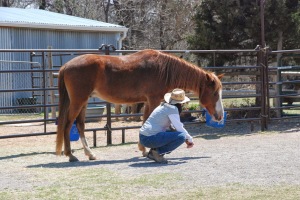 You can be certain if you don’t feel it, the horse isn’t going to feel it, because they are the most authentic beings in the universe.
You can be certain if you don’t feel it, the horse isn’t going to feel it, because they are the most authentic beings in the universe.
Besides being “dominant,” you must be “authentic” too. How’s that for a heavy burden to put on someone?
I believe that very few horses are really very “dangerous” in nature. Sometimes it is very true that the horse is rank and not safe for most people. The question is, can the horse change?
For most horses, their danger to humans is in how big they are, their schooling or lack of it, and how clueless people can be in relationship to them. Trainers have a difficult job because they worry about the liability of someone who is not a good horse handler, who may have a horse who is too much for them. A horse will take advantage of someone who doesn’t have good boundaries and lets him walk all over her. Yet just becoming “stronger” or “a better leader” on the outside doesn’t change the interior timidity or aggression of the person or how they feel. The horse responds to the inner you, not the face you put on the situation.
Another consideration is that the horse may not be feeling well. Horses with ulcers, extreme fly sensitivity, head trauma, bad teeth, hooves – the list goes on here – can exhibit behavioral issues. A vet visit is in order here. Keep in mind also that even if he checks out okay with the vet, there can be more going on than meets the eye and he may need bodywork treatments. Recently, I encountered a gelding who was fearful about the trail after years of enjoying it just because his feet were not balanced correctly and he could not contact the ground in the way he needed.
Often the trainer demonstrates getting “big” with the horse so the owner has a tool to use when she isn’t getting anywhere with her horse. It’s an hour-long lesson, and they have to get the horse lined out reasonably so the student can get on and ride. Make sense? Sadly, though, the problem is not yet solved.
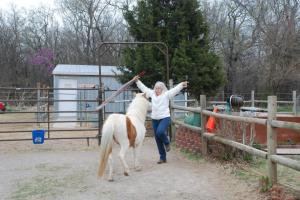
A way to achieve this state of “authenticity” I talked about is to find it in yourself with the help of a professional Liberty Foundation coach. What we do in a session is very body-based. As I am a bodyworker, I spend a lot of time helping people “self-correct,” meaning helping them find the strength and truth in their own bodies, so they can rebound from injuries and illnesses more effectively. For many people, the truth in their bodies speaks louder than the talk therapist they go to, and they are surprised when they experience shifts in consciousness in addition to shifts in the state of their health during a bodywork session.
![[Catherine Sobredo Photography]](https://horsesatliberty.files.wordpress.com/2012/08/imgp2364-edit.jpg?w=198)
The work is support and body based. The support comes from learning body language, and learning what works. Many people come with an agenda: they have taken countless riding lessons, horse training clinics and are full of knowledge they aren’t quite sure what to do with. Their horse may or may not comply with the requests made of her, but in some way this approach has been unsatisfactory or they wouldn’t be coming to my clinic. The student is seeking something more, as usually they are experiencing a disconnect in relationship and want to fill that gap.
Sometimes students will ask me or tell me, Oh, it’s like another famous trainer, or something, and I’ll say, no it isn’t. It’s like nothing you’ve done before. On the surface some things may at first appear similar but there is a huge difference.
The reason it isn’t like anything else is because we must start with our own energy first. With the healthy new 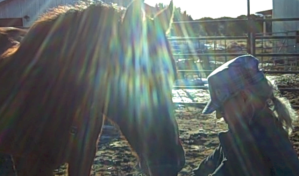 patterns in place, the changes in the student’s body language and demeanor will come naturally. Once that is clear and kept clear and grounded in our work, then the horse has a better chance of responding to the Foundations that come next. The Foundations are in themselves, very simple, but to do them without the energetic clearing they will be like any other laundry list of activities you learn to do with your horse.
patterns in place, the changes in the student’s body language and demeanor will come naturally. Once that is clear and kept clear and grounded in our work, then the horse has a better chance of responding to the Foundations that come next. The Foundations are in themselves, very simple, but to do them without the energetic clearing they will be like any other laundry list of activities you learn to do with your horse.
The horse can respond to the steps you have in mind for him, and just copy them and memorize them, but without any heart. His disapproval of that approach may appear in other ways. If he has freedom in choosing the relationship, there is no limit to what gifts he might give you.
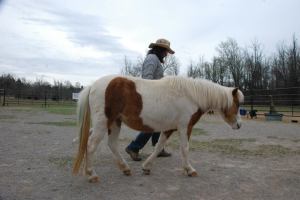
One thing is true: if you don’t have things entirely right – your horse will recognize the attempt to speak his language. He will be grateful, just like most people from other countries are happy you have bothered to learn a few phrases in their language. You can grow that to be bigger until you are almost “fluent.”
Often the person and horse really love each other but don’t know how to relate to one another. Something is “off” between them. I have written about Women who loves their horses too much and this is often part of the problem. It happens to men, too, but I think in a slightly different way than it does with women.
By approaching relationship with a horse with a foundation in liberty horsemanship, trust can be developed more holistically.
P.S. Oh, and by the way, I was told more than once that one of mine was “going to kill me.” 🙂 That horse set me on a path of exploration and looking at myself, and she is one of my greatest teachers. She is also incredibly reliable.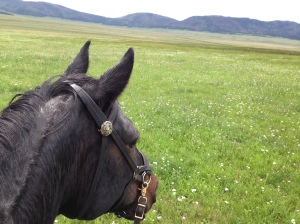
Related post:
I just got my horse back from the trainer and…
****
(copyright: Susan Smith, OrthoHorse)
Services: Bodywork (Ortho-Bionomy for people, Equine Ortho-Bionomy): private sessions, tutorials, phone consultations, Horse & Rider sessions, distance healing communication and gift certificates
Liberty Coaching: clinics, mini-clinics, workshops, private and semi-private sessions, tutorials, consultations: by appointment: 505.501.2478 or emailing susansmith@orthohorse.info Scheduling now. Contact me for details.
September 6 – One-Day Liberty Horsemanship Clinic. In this clinic you will learn the fundamentals of how to work with a horse at liberty, inspired by equine herd behavior. The way that horses interact with each other maintains cooperative relationships, safety and survival within a herd. No restraints are used – the horse becomes a willing participant. A working relationship is desired, where the horse has choice, and ultimately chooses the human to work with. This work extends and translates to all aspects of horsemanship – online and mounted.
9 a.m.-4:30 p.m. Limit: 8 people, 4 horses. $150 for clinic. $15 trailer in fee. Cancellations: 2 weeks prior to class are non-refundable.
September 27-28 – Spirit Horse Ranch Two-Day Liberty Foundations Clinic, Oklahoma City, Oklahoma – Engaging the Hearts and Minds of Horses. Susan Smith and Ruella Yates, co-teaching. Contact me or Ruella at 405-771-4274 (ruella@libertyfoundations.com)
Beginning in October: Liberty Foundations Online classes – beginning and advanced – offered by Susan Smith (October 1-beginning) and Ruella Yates (October 7-advanced), Horses at Liberty Online and Spirit Horse Ranch Online.
December 13-14 – Horses at Liberty Weekend Clinic, DeLand, Florida – Bring your Horse into Deep Working Connection with Liberty Horsemanship. Instructor: Susan Smith. Contact Anne Daimler tdaimler@cfl.rr.com (386-822-4564) Susan at susansmith@orthohorse.info (505-983-2128 or cell 505-501-2478) 9:00-4:30 p.m.
Susan is a member of the Independent Liberty Trainers Network. libertytrainersnetwork.com/



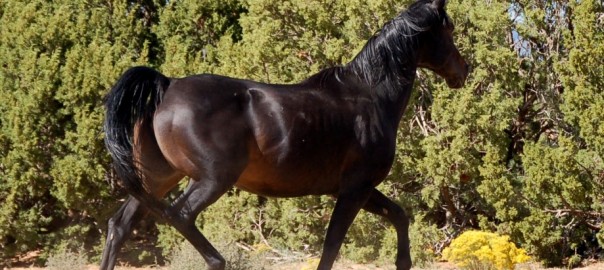
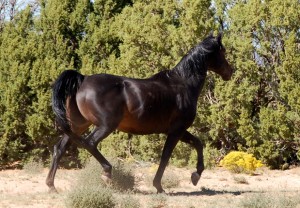
I’ve heard this myself, Susan, and ‘that horse’ didn’t kill me. He became my best teacher, best friend and completely reliable! You are correct; it’s all about energetic connection.
Maybe the warning is just the jumping off place for people to start inquiring about the relationship!
I just love to read your posts Susan. You are right on with everything I feel about our relashionship with our horses. Thank you for writing.
Thank you!